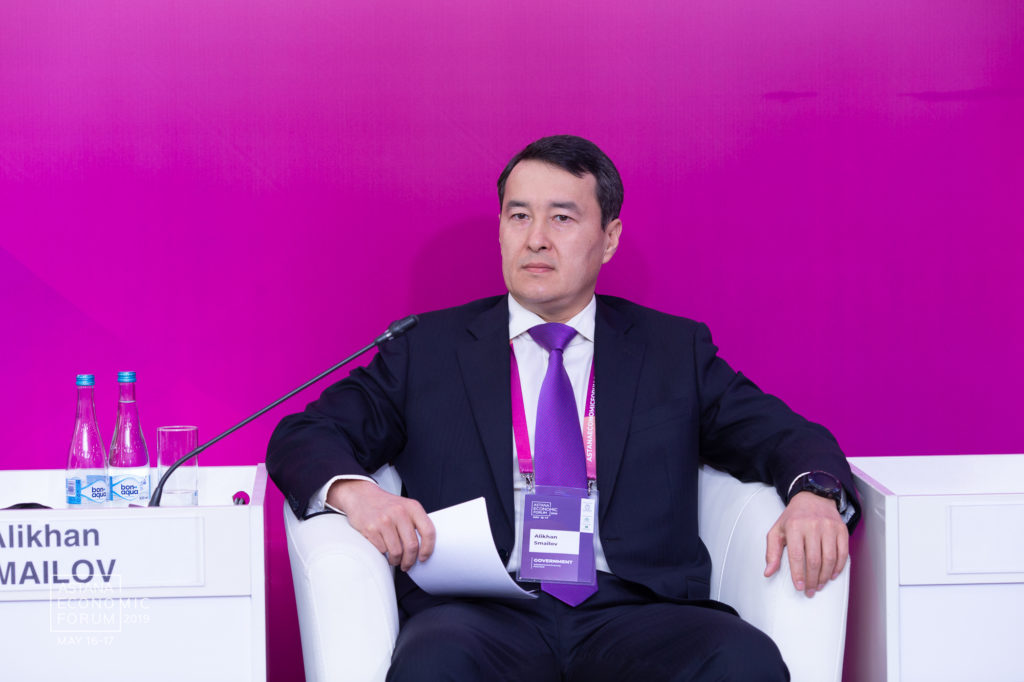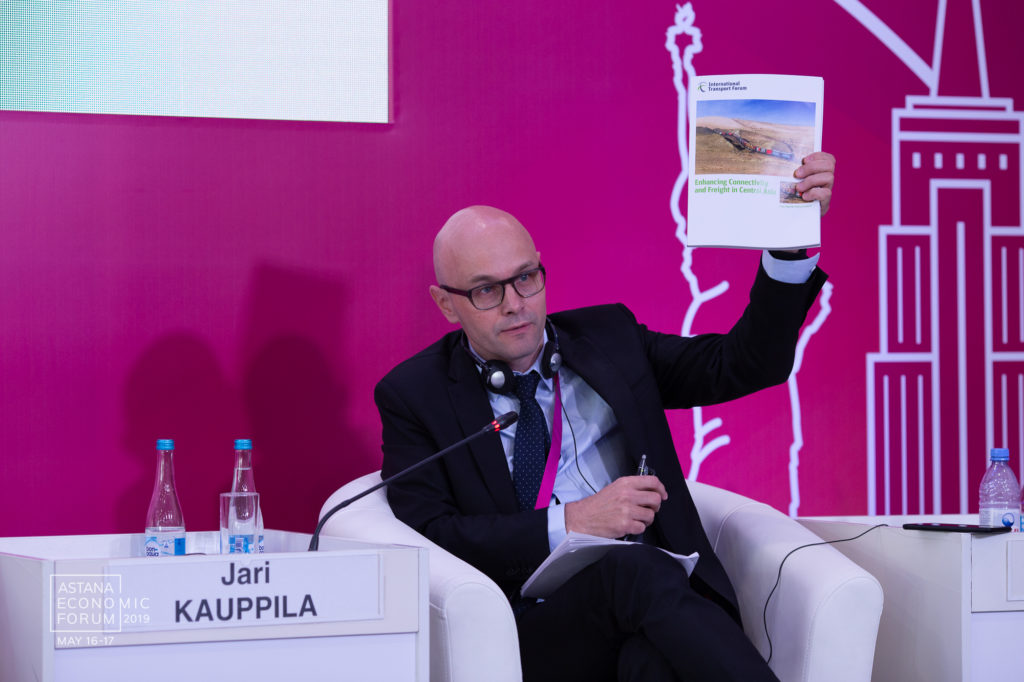NUR-SULTAN – Astana Economic Forum (AEF) participants discussed the role of Kazakhstan May 17 in cooperation with Central Asia and the Organisation for Economic Cooperation and Development (OECD). As a regional hub, they called on Kazakhstan to facilitate regional connectivity with global economy through transport infrastructure and improving human capital.
The panel session dedicated to OECD country review presented the latest cooperation results between the organisation and Kazakhstan, paying particular attention to OECD reports on labour productivity and regional connectivity.
“I want to thank Kazakhstan for supporting OECD’s work not only in Kazakhstan, but in the whole region,” said OECD Global Relations Secretariat (GRS) Eurasia division head William Tompson during his welcoming remarks. “Kazakhstan is our most active and main partner in the region. At the end of last year, we finished the country programme with Kazakhstan and signed a new memorandum on cooperation. Today, we will present the results of two projects. The first part [of the session] is about labour productivity, one of the main issues for Kazakhstan, and the second part is dedicated to trade and transportation connectivity in Central Asia. These issues are tightly interconnected, because improvement of connectivity will increase the competitiveness level of the market.”
Cooperation between Kazakhstan and OECD began in 2008 as part of the Eurasian Competitiveness Programme covering 13 countries in Central Asia, the Caucasus and Eastern Europe. Today, Kazakhstan cooperates under the memorandum of understanding between its government and the organisation. The country took OECD standards as a guide to improve its economic and social conditions, implementing them into national programmes and strategies.
“It is ten years already that OECD standards became a guide for structural economic and social reforms in Kazakhstan,” said First Deputy Prime Minister and Minister of Finance Alikhan Smailov. “Kazakhstan entered the list of 50 competitive countries and 30 countries in ease of doing business. During the independence years, Kazakhstan attracted more than $320 billion in foreign direct investments. It is more than 80 percent of the investments attracted to the Central Asian region. It shows global business trust in Kazakhstan… The country’s trade with OECD countries is more than half of the goods turnover in the region.”
Kazakhstan certainly has space to develop and has already seen results, especially in attracting foreign investments and business development.
“Today, we are facing a period of global sluggish growth. In this context, cooperation between the OECD countries and Kazakhstan has had to improve policies here in the country. Implementation challenges remain, of course, but there was clear evidence of the Kazakh government’s commitment to improve in many spheres. Kazakhstan, for example, has increasingly opened economic sectors for foreign investment… The country also introduced facilitation mechanisms like the business ombudsman,” said OECD GRS Director Andreas Schaal.
Kazakhstan signed a country strategy in 2015, implementing 13 projects during the first phase (2015-2017). OECD made recommendations in healthcare, education, employment, social integration, career enhancement, environment, competitiveness, business environment, regional development, public administration and statistics. The second phase consists of 15 projects and OECD recommendations are expected in 2020. To date, the country has executed three projects; the rest are in process.
In the future, Kazakhstan and OECD plan to work together to improve labour productivity, education, tourism, public administration and anticorruption policies.
“We set an ambitious goal to reach developed countries’ indicators by 2050 – to reach a $60,000 gross domestic product per capita in purchasing power adjusted dollars, to increase life expectancy by 11 years reaching 84 years, to decrease the unemployment rate to 3 percent… and increase goods and services exports to $90 billion. We also want to decrease the government’s share in the country’s economy,” said Minister of National Economy Ruslan Dalenov.
To increase labour productivity and follow OECD suggestions, the country started the Digital Kazakhstan programme, which is “a new and good source of economic growth,” he noted. Kazakhstan also has the potential to develop in e-commerce and goods transit.
Implementing the recommendations, the country also became a member of a number of OECD bodies.
“Participating in the OECD bodies and in such OECD tax evasion global initiatives as the fight against cross border gives Kazakhstan a more active role and allows the country to have different perspectives to high level international discussion in investment, industry and education,” said Schaal.
OECD reports indicate that, although Kazakhstan has shown productivity growth in recent years, the country remains dependent on the oil and gas industry. The organisation suggests digitisation is one of the main drivers to reach high and stable productivity growth.
“To understand the factors that make some firms so much better than others in not only adopting technologies, but making the most of them, …we can categorise them [the factors] in three broad groups such as incentives, capabilities and opportunities. Incentives are a pressure that firms are facing to invest in new technologies to keep their competitive edge… It is the degree of market competition, openness, ease of entry and exit… Capabilities are skills. They are not literacy, problem solving… they are technical skills, exposure to computers, understanding digitisation and good managerial skills. Opportunities are about allowing new, innovative firms to achieve the scale needed to make their investment profitable,” said OECD Economics Department Deputy Director Alain de Serres.
“We are not talking just about numbers; we are talking about our people, citizens. Productivity is not just about making work more efficient; it’s about enabling them to improve their skills and working conditions. And connectivity is more than facilitating movement of goods and capital; it enables use of technology and more crucially of ideas. In the end, it means more and better jobs,” stressed Schaal.
Concerning connectivity, the OECD report suggests Kazakhstan continue developing hard and soft infrastructure (for example, border crossing procedures), paying particular attention to its assessment tools and seeing the development from a broader perspective to distinguish the impact of one project to another.
“Another element is highlighting the importance of not only looking at one measure at a time… If you improve the border crossing, there might be shifts where and when you need to invest for the infrastructure as well. This brings me to another point, which is extremely important – building analytical capacity in the region to be able to assess changes and plan infrastructure needs related to the other measures,” said OECD Quantitative Policy Analysis and Foresight at International Transport Forum head Jari Kauppila.
The two-day forum included more than 50 sessions and events, a record in AEF’s 12-year history. In conjunction with the OECD country review session, the second day presented numerous activities including the first Forum for Sustainable Development Goals in Kazakhstan, the International Monetary Fund’s inaugural roundtable, a session on green technologies and building, smart cities, artificial intelligence, cybersport, women in business and science, youth issues and civil society.





